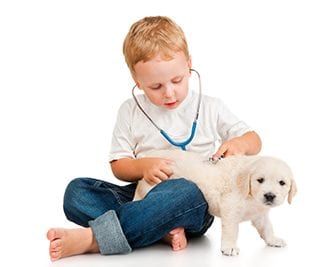 Just as any doctor would be lost or useless without his or her nursing staff, so too Veterinarians would be equally so without all Veterinary Technicians do. But who are these masked heros in surgical garb, and what do they do exactly?
Just as any doctor would be lost or useless without his or her nursing staff, so too Veterinarians would be equally so without all Veterinary Technicians do. But who are these masked heros in surgical garb, and what do they do exactly?
They are the pet-lovers’ pet-lover; those you see most when you take your dog, cat, bird or other exotic pet to the Vet. They not only greet and welcome you, they run critically important tests that monitor your pet’s vital signs. They assess your pet’s condition and communicate their critical evaluation directly to the veterinarian, including the administration of anesthesia when necessary. Believe it or not, this occurs most every day, in virtually every veterinary practice. And, while veterinarians know anesthesia is quite routine, pet-owners, and Pet Vet Techs specifically, treat anesthesia like it’s anything but “routine”. In this way, Veterinary technicians are a vital part of the team when pets are under anesthesia, with specially trained technicians monitoring sedation to allow veterinarians to make adjustments quickly and efficiently.
I’ll bet you never thought of Pet Vet Techs as Dentists, did you? But they are, as your Vet Tech is also an essential part of the team when your pet is in for dental care. From the pearly whites you see, to the doggy breath you should never smell, Pet Vet Techs are essential, working right alongside your veterinarian throughout most every procedure to get your pet’s teeth cleaned and polished, including under the gums, and ready for you to maintain at home.
Vet Tech as Surgeon? Vet techs can now be certified—after sufficient experience, training and testing of course—to serve in a wide range of specialized surgical duties. Unlike human medicine, wherein a surgical nurse will likely work in surgery and nowhere else, in veterinary medicine, highly trained technicians will work in many different areas within the clinic on any given day…including surgery itself.
In addition to all the above, Pet Vet Techs serve as Phlebotomists. So, when you hear the words, “We’ll have to run a few tests,” and you’re off to sit in the comfort of the waiting room chair, vet techs will be drawing blood on patients who are often far less cooperative than in human medicine. And, as if that weren’t enough, Pet Vet Techs also work as Radiology Techs, getting the radiographs that are often key to accurate diagnosis. Now think of all the vet techs working in Zoos, aquariums, national parks, even in the military, not to mention those engaging their talents in varied veterinary fields of medical research, or those laboring in organizations such as World Vets, helping animals and people around the globe.
Is it any wonder we choose to take the time during this week from October 14th through the 20th to join in National Veterinary Technician Week; its aim: to celebrate these knowledgeable individuals who have dedicated their professional lives to the service of their animal patients.
In fact, all across the country, people are joining us in taking part in celebrations and recognizing these most valuable of pet-care professionals as, without them, our beloved pets would not receive the high quality care that they need. As they do far more than just hold your pet still while the Veterinarian does all the important stuff.
They are truly the unsung heros! Well, up ‘til now. As, if we all do this as well as they do all that they do, they’ll not be quite as “unsung” as they have been.
So, to each and every Pet Vet Tech utilizing their talents, guided by their hearts, we not only salute you, we honor and celebrate you…and offer a most heartfelt “THANK YOU!”

